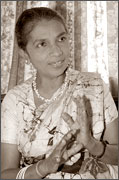Brave new world
by Aditha Dissanayake
[email protected]
Remember Shawshank Redemption.?That rather old fashioned movie in
which Tim Robbins plays a 1940s banker wrongly
 jailed
for his wife's murder, while Morgan Freeman plays his protective prison
mentor? You are forgiven if you don't remember the names of the actors
or the title, but you surely ought to remember the four letters Tim
holds onto while in prison "Hope". jailed
for his wife's murder, while Morgan Freeman plays his protective prison
mentor? You are forgiven if you don't remember the names of the actors
or the title, but you surely ought to remember the four letters Tim
holds onto while in prison "Hope".
Though she has not seen or heard of the movie this is exactly what
Miranda Hemalatha too holds on to, in her tireless mission to make the
world a better place for children with Down Syndrome. She voices almost
the same words heard in Shawshank when she says "Hope is a good thing
and there is hope for all those special children out there" .
Formerly the Director of Aesthetic Education of the National
Institute of Education, Maharagama, Hemalatha now spends her time
conducting classes for children with Down Syndrome because she strongly
believes that, if given the right kind of support and encouragement
these children will reach their potential. Quoting medical records she
further adds that the intellectual capability of children with Down
Syndrome varies from individual to individual.
With opportunities and knowledge, a person with Down Syndrome can
become a valuable member of the workforce and their community. "Most
parents feel unhappy when they learn their child has Down Syndrome.
Their biggest worry is that there will be no one to look after the child
when they die". Says Hemalatha.
|

Miranda Hemalatha |
Even though educationists and researchers are still discovering the
full educational potential of children with Down (DS) Syndrome, most
children with DS have intelligent levels witch range from mild to
moderate, and so, they too like all other children demonstrate a wide
range of capabilities.
"Irrespective of their gender, these children should be taught to
cook. If they can make their own meals they can lead independent lives"
observes Hemalatha. She also reminds that society should not
underestimate these children nor forget that they respond tremendously
to encouragement.
" Most of my children are doing very well" she says with the pride of
a teacher who has done her best for her students. She names two, Uditha
Kumara and Yasass Madushanka who had achieved a lot through the
education they had received from her - all through music. The
outstanding star among them however, is a girl who is working as a
teacher at the Ladies' College.
Grateful to the Principal of Ladies' College, Hemalatha says if there
are other educational institutes that would like to provide jobs to
these special children she is ready to help.At present she conducts
three classes, in Gampaha, Kalutara and Galle and hopes to have a
residential institute built for children with Down Syndrom. "I would
like to give them vocational training. Teach them agriculture, carpentry
etc."
But as in most things in life, there is a hitch to prevent her from
achieving this dream, Money. "I have already acquired land for the
institute, but need Rs. 75 million to complete the buildings. How can a
small woman like me find such a lot of money." But, unwilling to give
up, she keeps on searching for funds because she wishes to reach out to
parents who find themselves filled with sadness when they realize all
that they plan to do for their child, with special needs, is hard to
achieve.
She wants them to have this institute to turn to where they would be
able to help their children find a brave new world.
Let's keep hoping a few kind donors will show up to help her. Like in
Shawshank Redemption let this story too have a happy ending.
*****
People first
* Individuals with Down syndrome are people first, with the same
rights and needs as everyone else.
* The development of individuals with Down syndrome is influenced by
the quality of care, education, and social experience offered to them,
just like all other people.
The daily lives of individuals with Down syndrome, whatever their
age, are influenced by the resources available to them and the attitudes
of the people they live with, the people they meet in the community and
the people who support or teach them.
Labels matter
The words that we use to describe people convey powerful messages.
According to Sue Buckley the author of Living with Down Syndrome "The
term Down syndrome is in common use because Dr. Langdon Down first
described the condition.
Traditionally, the term was 'Down's syndrome' for many years but all
English speaking countries except the UK have moved to Down syndrome in
recent years, reasoning that Langdon Down neither had nor owned the
condition so the possessive form is not appropriate.
If people with Down syndrome are people first and their development
is not predictable purely on the basis of the diagnosis then it is very
important that our everyday language reflects this knowledge.
It is important to always refer to the person first, that is, to
always talk about a child with Down syndrome or an adult with Down
syndrome if it is necessary to refer to the diagnosis, not a 'Down's
child' or even worse 'a Downs' (as in 'We've got a Downs in our school',
for example).
Children and adults with Down syndrome hear how we talk about them
and it affects their self-image and self-esteem. If you had Down
syndrome how would you like to hear yourself and the condition
described? Please take a minute to reflect on this question". |
